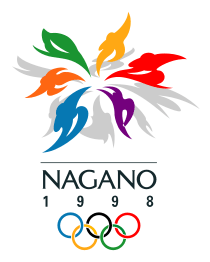1998 Winter Olympics
|
The emblem represents a flower, with each petal representing an athlete practicing a different winter sport. It can also be seen as a snowflake, thus the name "Snowflower" was given to it. | |||
| Host city | Nagano, Japan | ||
|---|---|---|---|
| Motto | Coexistence with Nature (Japanese: 自然との共存, Shizen to no Kyōzon) | ||
| Nations participating | 73 | ||
| Athletes participating | 2,176 (1,389 men, 787 women)[1] | ||
| Events | 68 in 7 sports (14 disciplines) | ||
| Opening ceremony | 7 February | ||
| Closing ceremony | 22 February | ||
| Officially opened by | Emperor Akihito | ||
| Athlete's Oath | Kenji Ogiwara | ||
| Judge's Oath | Junko Hiramatsu | ||
| Olympic Torch | Midori Ito | ||
| Stadium | Olympic Stadium | ||
| Winter: | |||
| |||
| Summer: | |||
| |||
The 1998 Winter Olympics, officially the XVIII Olympic Winter Games (French: Les XVIIIes Jeux olympiques d'hiver [2]) (第十八回オリンピック冬季競技大会 Dai Jūhachi-kai Orinpikku Tōkikyōgi Taikai), was a winter multi-sport event celebrated from 7 to 22 February 1998 in Nagano, Japan.
72 nations and 2,176 participants contested in 7 sports and 68 events at 15 venues. The Games saw the introduction of women's ice hockey, curling and snowboarding. National Hockey League players were allowed to participate in the men's ice hockey.
The host was selected on June 15, 1991, over Salt Lake City, Östersund, Jaca and Aosta. They were the third Olympic Games and second winter Olympics to be held in Japan, after the 1964 Summer Olympics in Tokyo and the 1972 Winter Olympics in Sapporo. Nagano is so far the southernmost city to host a Winter Olympics, next to Squaw Valley, host of the 1960 Winter Olympics. The games were succeeded by the 1998 Winter Paralympics from 5 to 14 March. These were the final Winter Olympic Games under the IOC Presidency of Juan Antonio Samaranch.
Host city selection
Other candidate cities for the 1998 Olympics were Aosta, Italy; Jaca, Spain; Östersund, Sweden; and Salt Lake City, United States. The host city selection was held in Birmingham, United Kingdom, on 15 June 1991, at the 97th IOC session. Nagano prevailed over Salt Lake City by just 4 votes. In June 1995, Salt Lake was chosen as the host of the following 2002 Winter Olympics.
The Nagano Olympic bid committee spent approximately $14 million to entertain the 62 International Olympic Committee members and many of their companions. The precise figures are unknown since Nagano, after the IOC asked that the entertainment expenditures not be made public, destroyed the financial records.[3][4]
| 1998 Winter Olympics bidding results[5] | ||||||
|---|---|---|---|---|---|---|
| City | Country | Round 1 | Round 2 (Run-off) | Round 3 | Round 4 | Round 5 |
| Nagano | | 21 | — | 30 | 36 | 46 |
| Salt Lake City | | 15 | 59 | 27 | 29 | 42 |
| Östersund | | 18 | — | 25 | 23 | — |
| Jaca | | 19 | — | 5 | — | — |
| Aosta | | 15 | 29 | — | — | — |
Marketing
Mascots
Sukki, Nokki, Lekki and Tsukki, also known as the Snowlets are the 1998 Winter Olympic mascots and are four snowy owls. They represent respectively fire (Sukki), air (Nokki), earth (Lekki) and water (Tsukki) and together they represent the four major islands of Japan.
Sponsors
| Sponsors of the 1998 Winter Olympics |
|---|
| Worldwide Olympic Partners |
Gold Sponsors
|
Official Supporters and Suppliers
|
Highlights
Bjørn Dæhlie won 3 gold medals in cross-country skiing, making him the Winter Olympic competitor with the most wins ever. Alpine skier Hermann Maier survived a fall in the downhill and went on to win gold in the super-G and giant slalom. Netherlands won 5 of the 10 speed skating events, including 2 each by Gianni Romme and Marianne Timmer. Canada beat Denmark in the women's curling final, securing the latter their first Winter Olympic medal ever.
- Women's ice hockey was contested at the Olympic Games for the first time ever, and the United States beat the Canadians 3–1 for the gold medal. United States went undefeated in the women's tournament. The Czech Republic defeated Russia by a score of 1–0 for the men's gold medal, while Finland won both the men's and women's bronze medals for ice hockey.
- Cross-country skier Bjørn Dæhlie of Norway won three gold medals in Nordic skiing to become the first winter Olympian to earn eight career gold medals and twelve total medals.
- Curling returned as an official sport, after having been demoted to a demonstration event after the inaugural Winter Games in Chamonix in 1924.
- Snowboarding debuted as an official sport.
- Players from the NHL were able to compete in men's ice hockey due to a three-week suspension of the NHL season.
- Tara Lipinski, 15, narrowly beat Michelle Kwan in women's figure skating to become the youngest champion in an individual event in the history of the Winter Olympics.
- Alpine skier Hermann Maier (Austria) survived a fall in the downhill and went on to gold in the super-g and giant slalom.
- Speed skaters Gianni Romme and Marianne Timmer won two gold medals each for the Netherlands; 5 out of 10 titles in speed skating went to the Netherlands.
- Snowboarder Ross Rebagliati (Canada) won the gold medal, after initially being disqualified for testing positive for marijuana.
- Azerbaijan, Kenya, the Republic of Macedonia, Uruguay, and Venezuela made their first appearance at the Olympic Winter Games.
- Denmark won their first winter Olympic medal (and only one to date) when they won a silver medal in the women's curling event.
- Australia won their first individual Winter Olympic medal when Zali Steggall won bronze in the women's slalom.
Events
There were 68 events contested in 7 sports (14 disciplines).
 Alpine skiing (10) ()
Alpine skiing (10) ()  Biathlon (6) ()
Biathlon (6) ()  Bobsleigh (2) ()
Bobsleigh (2) ()  Cross-country skiing (10) ()
Cross-country skiing (10) ()  Curling (2) ()
Curling (2) ()  Figure skating (4) ()
Figure skating (4) ()  Freestyle skiing (4) ()
Freestyle skiing (4) ()  Ice hockey (2) ()
Ice hockey (2) ()  Luge (3) ()
Luge (3) ()  Nordic combined (2) ()
Nordic combined (2) ()  Snowboarding (4) ()
Snowboarding (4) ()  Ski jumping (3) ()
Ski jumping (3) ()  Short track speed skating (6) ()
Short track speed skating (6) ()  Speed skating (10) ()
Speed skating (10) ()
Venues
- Hakuba Ski Jumping Stadium: Nordic combined (ski jumping), Ski jumping
- Happo'one Resort: Alpine skiing (Downhill, Super G, combined)
- Snow Harp, Kamishiro: Cross-country skiing, Nordic combined (cross-country skiing)
- Iizuna Kogen Ski Area: Freestyle skiing
- Spiral, Asakawa: Bobsleigh, Luge
- Kazakoshi Park Arena: Curling
Nagano
- Minami Nagano Sports Park: Ceremonies (opening/ closing)
- Aqua Wing Arena: Ice hockey
- Big Hat: Ice hockey (final)
- M-Wave: Speed skating
- White Ring: Figure skating, Short track speed skating
- Nozawa Onsen Ski Resort: Biathlon
- Mount Higashidate: Alpine skiing (giant slalom)
- Mount Yakebitai, Shiga Kogen Resort: Alpine skiing (slalom), Snowboarding (giant slalom)
- Kanbayashi Snowboard Park: Snowboarding (Half-Pipe)
Calendar
- All dates are in Japan Standard Time (UTC+9)
| ● | Opening ceremony | Event competitions | ● | Event finals | ● | Closing ceremony |
| February | 7 Sat | 8 Sun | 9 Mon | 10 Tue | 11 Wed | 12 Thu | 13 Fri | 14 Sat | 15 Sun | 16 Mon | 17 Tue | 18 Wed | 19 Thu | 20 Fri | 21 Sat | 22 Sun | Events |
|---|---|---|---|---|---|---|---|---|---|---|---|---|---|---|---|---|---|
| 1 | 2 | 2 | 1 | 2 | 1 | 1 | 10 | ||||||||||
| 1 | 1 | 1 | 1 | 1 | 1 | 6 | |||||||||||
| 1 | 1 | 2 | |||||||||||||||
| 1 | 1 | 1 | 2 | 1 | 1 | 1 | 1 | 1 | 10 | ||||||||
| 2 | 2 | ||||||||||||||||
| 1 | 1 | 1 | 1 | 4 | |||||||||||||
| 2 | 2 | 4 | |||||||||||||||
| 1 | 1 | 2 | |||||||||||||||
| 1 | 1 | 1 | 3 | ||||||||||||||
| 1 | 1 | 2 | |||||||||||||||
| 2 | 1 | 3 | 6 | ||||||||||||||
| 1 | 1 | 1 | 3 | ||||||||||||||
| 1 | 2 | 1 | 4 | ||||||||||||||
| 1 | 1 | 1 | 1 | 1 | 1 | 1 | 1 | 1 | 1 | 10 | |||||||
| Total events | 3 | 3 | 5 | 7 | 4 | 3 | 4 | 6 | 5 | 6 | 4 | 5 | 5 | 6 | 2 | 68 | |
| Cumulative total | 3 | 6 | 11 | 18 | 22 | 25 | 29 | 35 | 40 | 46 | 50 | 55 | 60 | 66 | 68 | ||
| Ceremonies | ● | ● | |||||||||||||||
| February | 7 Sat | 8 Sun | 9 Mon | 10 Tue | 11 Wed | 12 Thu | 13 Fri | 14 Sat | 15 Sun | 16 Mon | 17 Tue | 18 Wed | 19 Thu | 20 Fri | 21 Sat | 22 Sun |
Medal table
(Host nation is highlighted.)
| Rank | Nation | Gold | Silver | Bronze | Total |
|---|---|---|---|---|---|
| 1 | | 12 | 9 | 8 | 29 |
| 2 | | 10 | 10 | 5 | 25 |
| 3 | | 9 | 6 | 3 | 18 |
| 4 | | 6 | 5 | 4 | 15 |
| 5 | | 6 | 3 | 4 | 13 |
| 6 | | 5 | 4 | 2 | 11 |
| 7 | | 5 | 1 | 4 | 10 |
| 8 | | 3 | 5 | 9 | 17 |
| 9 | | 3 | 1 | 2 | 6 |
| 10 | | 2 | 6 | 2 | 10 |
Participating National Olympic Committees
72 nations participated in the 1998 Winter Olympic Games. The nations Azerbaijan, Kenya, Macedonia, Uruguay, and Venezuela participated in their first Winter Olympic Games.

The following 13 countries registered to take part, but eventually did not send a team.[6]
References
- ↑ "The Olympic Winter Games Factsheet" (PDF). International Olympic Committee. Retrieved 5 August 2012.
- ↑ "French and English are the official languages for the Olympic Games.", .(..)
- ↑ Jordan, Mary; Sullivan, Kevin (21 January 1999), "Nagano Burned Documents Tracing '98 Olympics Bid", Washington Post, pp. A1, retrieved 20 August 2016
- ↑ Macintyre, Donald (1 February 1999). "Japan's Sullied Bid". Time Magazine. Retrieved 20 August 2016.
- ↑ "Past Olympic host city election results". GamesBids. Archived from the original on 17 March 2011. Retrieved 17 March 2011.
- ↑ The XVIII Olympic Winter Games Official Report
External links
| Wikimedia Commons has media related to 1998 Winter Olympics. |
- "Nagano 1998". Olympic.org. International Olympic Committee.
- "Results and Medalists". Olympic.org. International Olympic Committee.
- The Organizing Committee for the XVIII Olympic Winter Games, Nagano 1998 (1998). The XVIII Winter Olympic Games: Official Report. The Organizing Committee for the XVIII Olympic Winter Games. Downloadable PDF: Volume 1, Volume 2, Volume 3, Appendix, retrieved on 17 January 2010.
| Preceded by Lillehammer |
Winter Olympics Nagano XVIII Olympic Winter Games (1998) |
Succeeded by Salt Lake City |
